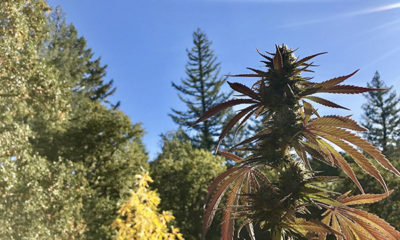
Joint Opinions
The Big Problem With the Latest Opiates & Marijuana Study
Medical cannabis became legal in the states with the biggest increases in opiate-overdose deaths, but there’s no connection proven (or dismissed).
America’s worst-ever drug problem, the ongoing opiate-fueled overdose apocalypse, is by now a chronic condition and one for which both easy and simple solutions as well a single easily identifiable cause have been elusive.
Continuing a steady upward trend
Some of the states with the worst increases year-over-year were the same states that have been on this same trend for years: Ohio, Pennsylvania. Michigan, Florida. One thing all of those states have in common: They all went for Donald Trump in the 2016 election. And they have all have passed laws expanding access to cannabis, either medical or recreational, since 2010.
Is there a connection? Nobody can say for certain, and that includes the authors of the study published June 10 in the Proceedings of the National Academy of Sciences, one of the U.S’s premier scientific journals, who found that a previously identified link between liberalized cannabis laws and a decrease in opiate overdoses reversed itself.
Researchers, including some of the country’s top drug policy experts, followed up on a prior study, published in the also-prestigious Journal of the American Medical Association (JAMA), that identified a dip in overdose deaths in states that had legalized cannabis access in some way through 2010.
That study has since been much touted in drug-policy reform circles and accepted by public-health officials as a potential balm for the overdose crisis. Several states, including Illinois, which legalized recreational marijuana via the legislature last month, have expanded medical-cannabis access specifically to patients prescribed opiates. And there were more than a few legalization zealots who abandoned caution and nuance and pushed the line that cannabis access directly led to fewer overdose deaths. (Among those who tread incautiously? This author, I’m unhappy to admit.)
“We weren’t happy when a billboard went up saying marijuana laws reduce overdose deaths,” said @BrendanSaloner of @JohnsHopkinsSPH. “That was very hard for us to rein in.” https://t.co/yjZzNmOQb1
— JHU Public Health (@JohnsHopkinsSPH) June 15, 2019
Seeking some clarity, researchers at Stanford University used the same methodology as the earlier study to looked at what had happened between 2010 and 2017. They found that despite increased cannabis access, many states, including Ohio, still experienced significant increases in opiate-overdose related deaths. But still, there’s a problem.
As someone whose career is focused on helping addicted people I really wish it were this easy but legalizing medical marijuana doesn’t curb opioid overdose deaths, study says https://t.co/XSVxRotLFx
— Keith Humphreys (@KeithNHumphreys) June 10, 2019
What does this mean? Maybe nothing, as the study’s authors themselves admitted. Or maybe something else.
It could be that the “correlation” was mere coincidence. That the states with bad opiate problems also approved medical or recreational legalization measures because it followed a nationwide trend, and drug-overdose deaths continued along the same trend, independent of one another.
It could also be that the drug-overdose crisis would have been worse without cannabis. Nobody can say, since the study cannot say. What they are sure is that there’s no causal link so far.
“If there is a relationship between medical cannabis use and opioid overdose on an individual level, this kind of study can’t reveal it,” as Chelsea L. Shover, a postdoctoral research fellow at the Stanford University School of Medicine and a lead author of the second study, told The New York Times.
At the same time, the study falls into another trap. It was the states with the worst pre-existing opiate overdose crises that happened to legalize cannabis between 2010 and 2017 — Ohio and Pennsylvania among them. That’s a complicating factor that the study simply could not control for, which means that while cannabis cannot be called a solution, it also cannot be ruled out as a change agent of some kind.
Problems this big, this bad, and this persistent have no single cause nor one single, simple solution. In Dayton, a struggling city in Ohio, which has consistently had one of the worst year-over-year increases in opiate deaths, officials managed to cut the overdose death rate by 50% in one year. And as they told the New York Times, they still aren’t exactly sure why.
Maybe expanded access to treatment, maybe expanded access to overdose-reversal drugs like Naxolone, maybe all of the above. One factor the article did not consider: the nine medical-marijuana dispensaries within a three-hour drive of the city, a thin concentration compared to states like California but significant in the Rust Belt. What did that do? Nobody can say for certain, but the answer is likely “not nothing.”
TELL US, do you think cannabis could be a potential solution to curb opioid overdoses?
























